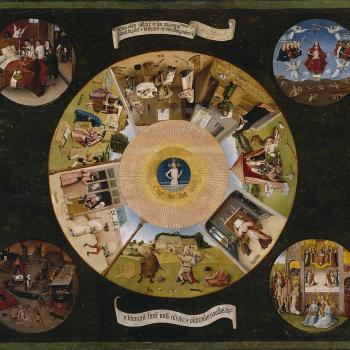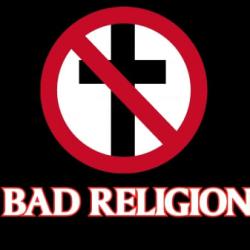
asked these on my blog. His words will be in blue.
*****
[M]y own deconversion essentially consisted of finally being able to take seriously the possibility that Christianity was entirely false. Once I stopped mentally recoiling from that idea, I could see how much sense it made. At that point, I didn’t need to do any elaborate reasoning any more, as I’d already been doing it for years as a Christian while trying to find intellectually satisfying answers to all kinds of tough questions about my faith. I’d been reading lots of books on apologetics and always felt dissatisfied, finding the arguments weak at best and outright ridiculous at worst – yes, while being a Christian and very much wanting to get rid of my recurring doubts, but not willing to knowingly compromise my intellectual integrity.
You did at least read and pursue apologetics. I commend you for that. Most who deconvert don’t seem to do so. You have honest difficulties and questions, and I admire the fact that you struggle with them and seek intellectual integrity. We all must do that.
Here are some of the questions I’d been grappling with, just off the top of my head:
Why is there evil in the world? If the answer is something complicated about free will and sin and so, why is there so much suffering in the animal world, and why are there natural disasters?
The problem of evil is the most difficult objection to Christianity, but not at all insurmountable, in my opinion; and there is also a corresponding “problem of good” for the atheist to grapple with. I’ve written a lot on both topics: posts found on my Philosophy & Science and Atheism & Agnosticism web pages.
Why does Jesus say that we will get whatever we ask in prayer, as we obviously don’t?
Because prayer is conditional upon being consistent with God’s will. So if we pray (to use an extreme example) for a difficult neighbor to be struck down and not able to talk or walk, that wouldn’t be in God’s will and God wouldn’t answer it.
1 John 5:14 (RSV) And this is the confidence which we have in him, that if we ask anything according to his will he hears us.
James 4:3 adds: You ask and do not receive, because you ask wrongly, to spend it on your passions.
Even something not immediately immoral or amoral wouldn’t necessarily be in God’s will, because He knows everything and can see where things might lead; thus may refuse some requests. When Jesus says “ask and you shall receive,” etc., it’s in a familiar Hebrew proverbial sense, which means that it is “generally true, but admits of exceptions.”
Why do Matthew’s references to Old Testament prophecies seem so farfetched?
Prophecy is an involved topic. How the NT cites prophecy is a complex sub-topic itself, but often it’s a paraphrase or a “free use” according to the established rules of language and thought in the Hebrew culture of that time.
Why does the historical record of how the Bible was put together look like a totally human affair, and how exactly did God inspire it?
The Bible looks like it was produced by humans because it was! But that doesn’t rule out its also being inspired and guided by God. Inspiration is another huge topic, but it’s not dictation.
If the original manuscripts are the real God’s Word, why didn’t God preserve them?
I imagine that God didn’t preserve the original manuscripts because He generally lets things be, and lets mankind be responsible for them. Atheists often exhibit a certain double standard or unreasonable demand. On the one hand, they demand all kinds of miracles in order to believe in God (like God writing “John 3:16” in the stars and suchlike). On the other hand, when they put on their science hats they act as if miracles are impossible or have never occurred in fact, or are unable to be proven / substantiated. Well, we Christians think miracles are very rare. So this was an instance where God chose not to miraculously preserve the original manuscripts. But He did preserve enough of the Bible to be able to present all of the theology necessary to know in Christianity, for salvation. He preserved it from error enough to accomplish His purposes.
Why is it so difficult to understand the Bible?
I wrote a paper directly on that topic:
Why are there so many different Christian denominations and sects, with so radically different ideas of what the Bible teaches?
Because Protestantism introduced a new principle of authority or rule of faith, called sola Scriptura, which I think is unbiblical and even illogical, and this false principle brought this sad state of affairs about; whereas the more traditional Christian groups (Catholicism and Orthodoxy) have remained quite unified, for the most part. This is one reason why I became a Catholic in 1990.
How can you tell which one is right?
By comparing its teachings with what the Bible and the Church fathers and apostles taught (apostolic succession). When they all line up, it’s plausible and sensible to believe that that group is the “fullness of the faith” (as we Catholics say Catholicism is).
Why did God order the Israelites to commit genocide?
See:
“How Can God Order the Massacre of Innocents?” (Amalekites, etc.)
. . . and explicitly allow slavery?
Very complex topic. See: The Bible, Church History, & Slavery (Resources).
Thanks, but I was telling about my past. I haven’t been struggling with those questions since my deconversion 26 years ago, as they got answered in one fell swoop. Sometimes I read some religious apologetics for fun, but I find it all equally unpersuasive, no matter whether it argues for any flavor of Christianity, Islam, New Age, Scientology, or whatever else I forgot to mention.
ETA: I think the main point of my original comment may have been somewhat unclear. I wanted to say that there are many ex-believers like me, who have spent years doing intellectual counterapologetics while seeking intellectual clarity of their faith, only to come to the conclusion that their faith is false. When that happens, you already know the answer long before you can emotionally accept it, so a description of the climax is likely to sound pretty unintellectual.
Yes, I readily acknowledged that I appreciated the fact that you read apologetics. So in your case you were unpersuaded. I am equally unpersuaded by the arguments against Christianity. Thus, it would have to be examined more deeply to determine why you were unpersuaded, and what false premises (from our perspective) you adopted, and why, to explain your rejection of all the apologetics arguments, and your unbelief. Atheists believe we are burdened by bad thinking; we feel the same about them.
The main reason I gave some sort of answer to the questions you listed, was to help those who still may be grappling with some of them, and to show that there are good answers and explanations to be had.
***
Photo credit: 3dman_eu (9-27-12) [Pixabay / CC0 Creative Commons license]
***

















